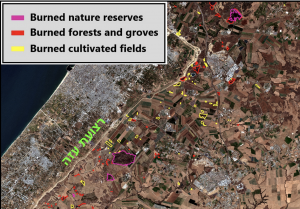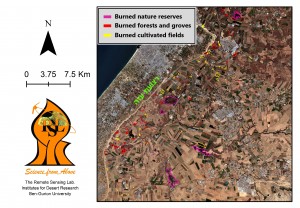Fires Ignited by Kite Terrorism Can Now Be Assessed Using Algorithm Developed by Researchers at Ben-Gurion University.
Ben-Gurion University of the Negev (BGU) researchers have developed a remote sensing algorithm that analyzes satellite images to identify and assess fire destruction caused by kites and other incendiary devices.
‘Kite terrorism’, balloons, and Molotov cocktails launched during Operation Wall Guard wreaked havoc on the area bordering the Gaza Strip. Explosives launched towards Israel destroyed fields, groves, nature reserves and wildlife, leaving behind scorched earth.
Prof. Arnon Karnieli, head of the Remote Sensing Lab in the BGU School of Sustainability and Climate Change, developed the AFRI (Aerosol Free Vegetation Index) algorithm, to see through even heavy smoke cover, and locate damaged areas. AFRI has been adopted by the European Space Agency (EUMETSAT) as a standard course of practice and will soon be deployed by Israeli agencies as well; In addition to its wartime application, AFRI’s has proven a be a valuable tool to help firefighters map fire-scarred areas safely and efficiently.
“The spectral signal of green agricultural lands is the same with or without a thick pall of smoke.” Karnieli says. “Satellite images taken over a number of days can differentiate between newly burned land and older damage.”
Using the algorithm, the researchers determined that in May 2021, during Operation Wall Guard, approximately 3,200 (13,050 dunams) acres of Israeli forest, reserves and farmland burned around Gaza.
The University is at the heart of Beer-Sheva’s transformation into an innovation district, where leading multinational corporations and start-ups eagerly leverage BGU’s expertise to generate innovative R&D.
BGU effects change, locally, regionally and internationally. With faculties in Engineering Sciences; Health Sciences; Natural Sciences; Humanities and Social Sciences; Business and Management; and Desert Studies, the University is a recognized national and global leader in many fields, actively encouraging multi-disciplinary collaborations with government and industry, and nurturing entrepreneurship and innovation in all its forms.





















